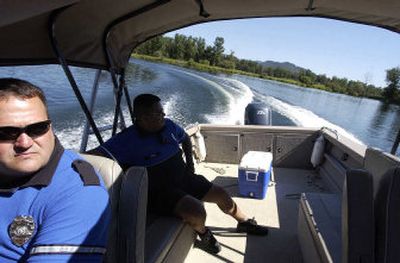Tribal patrol keeps water calm

It’s the blue uniforms that give them away.
Otherwise, the public might mistake officers Rich Wienclaw and Tom Bob as the public relations arms of the Coeur d’Alene Tribe.
As Wienclaw steered the Weldcraft boat along the St. Joe River toward St. Maries Friday, Bob’s hand stretched toward the sky, fingers wide, each time a kayak, boat or personal watercraft came into view.
“Everybody waves,” Bob noted as one waving boatload cruised by. “Public relations,” he added with a grin.
The Coeur d’Alene Tribe started its boat patrols soon after its ownership of the southern third of Lake Coeur d’Alene, 20 miles of the St. Joe River and part of Black Lake was upheld by the Idaho Supreme Court in 1998. Now the tribe has two boats in its fleet and regular patrols from Thursday through Monday in the summer.
This summer, tribal police Chief Tom Cronin added bicycle patrols along the tribe’s portion of the Trail of the Coeur d’Alenes.
So Bob and Wienclaw generally start their days on the bikes, ride about four hours and then jump in the boat and cruise the waters – waving.
They both wear bulletproof vests, but there seems to be no need for such protection. The traffic is generally light, and the reception from the public is generally friendly.
“We’ve had a lot of people give a lot of positive feedback, and saying they feel safer seeing us out,” Bob said.
They haven’t issued a single citation all summer, they said.
“My marching orders to them was to be friendly and helpful,” said Cronin. “They do boat inspections and make sure the people who are out there are operating safe.”
Bob and Wienclaw say a large part of their job is education. A lot of people profess ignorance of no-wake zones, for instance, or need to be reminded of the speed limit on the river – which is 35 mph.
The tribe has tried to make following the laws easier by adopting the same boating rules that apply statewide and in Kootenai County. All but two officers in the tribal police force have been through the Kootenai County Sheriff’s marine training.
“If you get too many laws that are conflicting, it’s just a big mess,” Wienclaw said.
The tribe does not have its own boater registration requirement, but it does require that anglers purchase a tribal fishing license to fish in tribal waters.
The Benewah County Sheriff also has two deputies assigned to patrolling the river in the summer, said Benewah County Undersheriff Larry Sotin.
“We work quite well with the tribe,” Sotin said. Wienclaw said that when the two patrols meet along the river, they often stop, talk and then turn around and head back the way they came.
The Kootenai County marine deputies don’t make it down past the tribe’s reservation boundaries often, even though the tribe’s lake jurisdiction overlaps with Kootenai County’s. The tribal officers say that’s probably because the north end of Lake Coeur d’Alene keeps those deputies plenty busy.
“We actually venture north to Rockford Bay to see what’s going on now and then,” Wienclaw said. “Then the water gets rough and we come back.”
So, for the most part, being a tribal marine police officer is smooth sailing. The most trouble they’ve had this summer has been a Jet Skier with a broken leg and towing stranded boaters to shore.
And on quiet days, they’ve had plenty of time to watch the osprey, the resident beaver, and even moose along the riverbank.
“I’d love to do this all year round,” Bob said happily.
At the Conkling Park Marina docks, the young boys say hello to the officers by name. In a couple of weeks, Bob and Wienclaw will hang up their life vests and start patrolling as school resource officers, educating kids on how to resist drugs and make good choices.
The boats will stay in the water as long as possible, so in case of a rare emergency on the lake, Bob and Wienclaw will be able to respond.